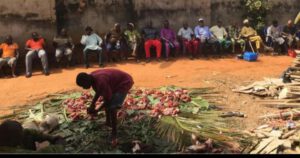By Uche Nworah, Ph. D
365Daily – Ndi Umunna, one’s kindred relatives play a very important role in the kindred, community and village. In addition to one’s parents and immediate family, Ndi Umunna help to shape one’s worldview, serve as instrument for conflict resolution, and also propagate social justice.
In traditional Igbo societies, decisions taken by Ndi Umunna are binding on the members of that particular Umunna. There are punishments for deviation. In extreme cases, punishment could be by way of ex-communication from all Umunna activities. Such severe punishment are to be avoided as it brings shame on one’s family. In such a situation, no member of the Umunna will enter the house or compound of the person that has been ex-communicated, or partake in any ceremony such as births, deaths and other ceremonies in his compound.
Ndi Umunna also play very critical roles during traditional marriage ceremonies involving one of their daughters. During the introduction, bride price negotiations and other related activities, including traditional marriage proper, it is the Umunna, and not the father of the bride that oversee the proceedings. Whatever conditions they give to the intending suitor is binding. This has often been a source of conflict as some fathers may object to the long list of marriage items given to the potential in-law by Ndi Umunna, but in the end, through cultural diplomacy and subtle negotiation, Ndi Umunna do have their way. The powers Ndi Umunna wield is in line with Igbo worldview, that a child belongs to the community, not just to the parents alone. Both the parents, Ndi Umunna and entire community all contribute to the upbringing of the child. This is why some still bear names such as Adaora, Nwora, Okoroama etc in Igboland.
The oldest man usually heads the Umunna and he also enjoys certain rights and privileges, for example breaking of kola nuts, pouring of libation and performing some other rites fall on him. He will be the first to take his share of kola nut, meat and other items at Umunna gatherings. In some communities, it is to be noted that there are certain parts of a cow slaughtered by a man or family which must always go to the Umunna, failing which conflict arises. For example, in Enugwu-Ukwu, if you slaughter a cow in your house for any event at all, you must present the head of the cow to your Umunna, and the waist (ukwu anu) to the women. There are also ways of paying restitution including purchasing whole cows instead for Ndi Umunna and the women.
In Igboland, the saying ‘remember the son of who you are’, extends beyond someone’s father. It extends to the Umunna as well. This is why for instance, if a person has done noble deeds, his Umunna will quickly claim credit by saying ‘Osi na agbulu anyi, ezigbo agbulu’, ‘He is from our lineage, a noble lineage’. However, if the reverse is the case, and someone belonging to a particular Umunna brings shame to the Umunna by committing a crime and other anti-social behaviour, his Umunna will quickly denounce him and question his lineage, thus the question, ‘Omero ka onye si na agbulu anyi, meaning, ‘That is not the behaviour of people from our lineage’. Such a person could be accused of having found his way into that Umunna through the ‘back door; ‘Ajo nwa si owelle baa nne ya na afo’.
Once a male child comes of age, and becomes economically active, he is expected to officially identify with his Umunna by registering his name (Idenye afa na akwukwo Umunna). He is also expected to contribute levies as and when due. Without doing this, he stands to lose his entitlements and will be regarded as a wayward person and ridiculed in the community (efulefu).
In Igboland, it is encouraged that any member of an Umunna who has found some success at work, business, school, and even marriage, and who has come to some good fortune such as surviving an accident or other life threatening conditions, celebrate such good fortune with the Umunna. This is done by slaughtering a cow, ‘Igbulu Ndi Umunna Efi’. Such a feast promotes kindred spirt, unity, togetherness, and conviviality.

An example of ‘Umunna’ social construct in Igboland could be seen here, ndi Ummunna’m, ‘Umuokpuora’ in Umuakwu village, Enugwu-Ukwu gather in our ancestral Obu on the eve of Christmas 2015; old and young, rich and poor, to share in equal measure a cow donated by one of us. The women do not partake as the men bring home the family’s share. This is done over drinks, nkwuenu, beer etc. Kola nuts are broken by the elders, libation poured, prayers said and stories of successes, failures and challenges shared. This is the unity that binds, a sense of community, love and ‘Igwebuike’. For things and times like these, Ndigbo journey from all over the world to their ancestral homes during the Christmas and other festive seasons; to share, to commune, to recharge and to give thanks to Chi. This is who we are, Ndigbo.
• Dr Nworah is the Managing Director of the Anambra Broadcasting Service (uchenworah@yahoo.com)